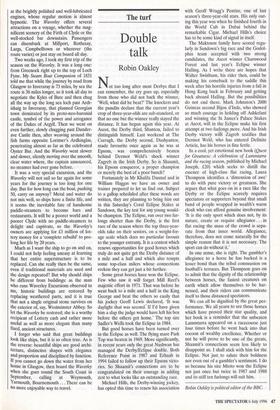The turf
Double talk
Robin Oakley
Not too long after most Derbys that I can remember, the cry goes up, especially from those who did not back the winner, `Well, what did he beat?' The knockers and the pundits declare that the current year's crop of three-year-olds are sub-standard, or that no one but the winner really stayed the distance. It has begun again this year. At Ascot, the Derby third, Shantou, failed to distinguish himself. Last weekend at The Curragh, the Derby second, Dushyantor, made favourite once again as he was at Epsom, was comprehensively beaten behind Dermot Weld's shock winner Zagreb in the Irish Derby. So is Shaamit, his Epsom conqueror, a proper champion or merely the best of a poor bunch?
Fortunately in Mr Khalifa Dasmal and in William Haggas we have an owner and trainer prepared to let us find out. Subject to a gallop scheduled after these words are written, they are planning to bring him out in this Saturday's Coral Eclipse Stakes at Sandown, the key test for any young would- be champion. The Eclipse, run over two fur- longs shorter than the Derby, is the first race of the season where the top three-year- olds take on their seniors, on a weight-for- age scale which does no particular favours to the younger entrants. It is a contest which renews opportunities for good horses which truly do not quite get the Derby distance of a mile and a half and which also tempts some top-class milers whose connections reckon they can get just a bit further.
Some great horses have won the Eclipse. Few who saw it will forget Mill Reef's majestic effort in 1971. That was before he went back to a mile and a half in the King George and beat the others so easily that his jockey Geoff Lewis declared, 'It was daylight that was second: If I'd have given him a slap the judge would have left his box before the others got home.' The top sire Sadler's Wells took the Eclipse in 1984.
But good horses have been turned over in the Eclipse as well. The flying mare Park Top was beaten in 1969. More significantly, in recent years only the great Nashwan has managed the Derby/Eclipse double. Both Reference Point in 1987 and Erhaab in 1994 failed to follow up their Epsom victo- ries. So Shaamit's connections are to be congratulated on their courage in adding zest to what looks like an outstanding race. Michael Hills, the Derby-winning jockey, has opted this time to renew his association with Geoff Wragg's Pentire, one of last season's three-year-old stars. His only out- ing this year was when he finished fourth in the World Cub in Dubai behind the remarkable Cigar. Michael Hills's choice has to be some kind of signal in itself.
The Maktoum family have scored regu- larly in Sandown's big race and the Godol- phin team accepted with two strong candidates, the Ascot winner Charnwood Forest and last year's Eclipse winner Hailing. As I write there are hopes that Walter Swinburn, his rider then, could be making his comeback to the saddle this week after his horrific injuries from a fall in Hong Kong back in February and getting back aboard Hailing. But the possibilities do not end there. Mark Johnston's 2000 Guineas second Bijou d'Inde, who showed so much courage in holding off Ashkelani and winning the St James's Palace Stakes at Ascot, will in the Eclipse make his first attempt at two furlongs more. And his Irish Derby victory wild Zagreb testifies that Dermot Weld, who has entered Definite Article, has his horses in fine fettle.
In a cool, yet emotional new book (Quest for Greatness: A celebration of Lammtarra and the racing season, published by Michael Joseph, £20) which seeks to distill the essence of high-class flat racing, Laura Thompson identifies a 'dimension of awe' to do with pure victory or greatness. She argues that what goes on in a race like the Derby or the Eclipse scarcely requires spectators or supporters beyond that small band of people wrapped in wealth's warm cloak who can afford genuine involvement: 'It is the only sport which does not, by its nature, create or require allegiance ... in flat racing the mass of the crowd is sepa- rate from that inner world. Allegiance, therefore, does not come naturally for the simple reason that it is not necessary. The sport can do without it.'
In one sense, she is right. The gambler's allegiance to a horse he has backed is a lesser bond than the tribal communion on football's terraces. But Thompson goes on to admit that the dignity of the relationship between horses, the fastest creatures on earth which allow themselves to be har- nessed, and their riders can communicate itself to those distanced spectators.
We can all be dignified by the great per- formance. We all yearn to see those horses which have proved their star quality, and her book is a reminder that the unbeaten Lammtarra appeared on a racecourse just four times before he went back into that cocoon of wealthy excellence. Whether or not he will prove to be one of the greats, Shaamit's connections seem less likely to disappoint us. I shall stick with him for the Eclipse. Not just, to salute their boldness nor even out of a gambler's sentiment. I do so because his sire Mtoto won the Eclipse not just once but twice in 1987 and 1988 and its stiff ten furlongs will suit him.
Robin Oakley is political editor of the BBC.


























































 Previous page
Previous page